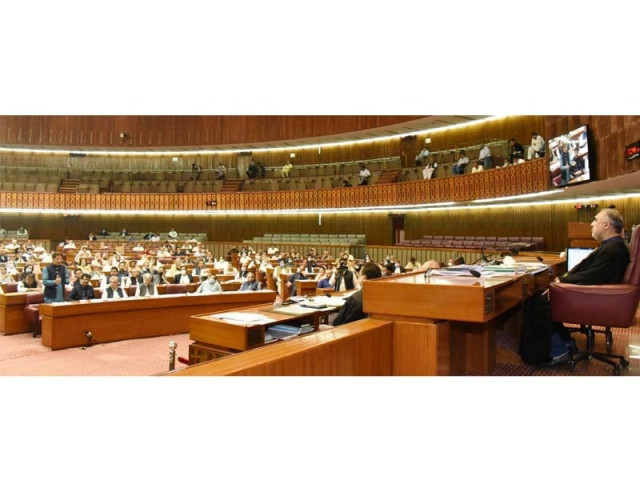Pakistan clears FATF legal hurdles
Joint sitting of parliament passes three bills to help country exit watchdog’s grey list

The country’s parliament on Wednesday wrapped up the legislation needed to steer the country out of global money-laundering and terrorism financing watchdog Financial Action Task Force’s (FATF) grey list by passing three bills at a joint sitting of the two houses amid a vociferous protest by the opposition lawmakers.
Apart from the three FATF-related laws -- the Islamabad Capital Territory Waqf Properties Bill, 2020; the Anti-Money Laundering (Second Amendment) Bill, 2020; and the Anti-Terrorism (Third Amendment) Bill 2020 -- five others bills were also passed during the joint session.
LIVE #APPNews : Joint Session of the Parliament #Islamabad @NAofPakistan @PresOfPakistan @SenatePakistan https://t.co/m27W3aLH7Z
— APP 🇵🇰 🇵🇰 (@appcsocialmedia) September 16, 2020
Between February and September, the parliament has amended 10 acts through 13 bills as part of Pakistan’s efforts to exit the Paris-based financial watchdog’s grey list in line with its 27-point Action Plan.
Speaking to The Express Tribune, Federal Law Minister Farogh Naseem confirmed that after the joint session Pakistan had “completed all FATF-related legislation before the deadline”.
“There were no more amendments required for now,” he said, adding that Pakistan would pass new laws or further amend the existing ones if required in future.
The FATF had placed Pakistan on its grey list in June 2018 and had asked Islamabad to implement the action plan by the end of 2019 but later extended the deadline because of the Covid-19 pandemic and delay on part of the country to meet the requirements.
The joint sitting, chaired National Assembly Speaker Asad Qaiser, was attended by Prime Minister Imran Khan, Leader of the Opposition in the National Assembly Shehbaz Sharif, PPP Chairman Bilawal Bhutto Zardari, PML-N Senior Vice President Shahid Khaqan Abbasi, Jamaat-e-Islami chief Sirajul Haq and PPP Senator Raza Rabbani among others.
As Adviser to the PM on Parliamentary Affairs Dr Babar Awan tabled the ICT Waqf Properties Bill 2020, which was initially passed through a voice vote, the opposition demanded a vote count. After the vote count, the speaker announced that the bill had been passed with 200 members voting in its favour and 190 against it.
As PTI MNA Maleeka Bokhari was reading out the proposed amendments to the clauses of the Anti-Money Laundering (Second Amendment) Bill, the opposition lawmakers staged a walkout.
The Anti-Money Laundering (Second Amendment) Bill and the Anti-Terrorism Act (Amendment) Bill were later passed without any opposition.
The Islamabad Capital Territory Waqf Properties Bill, 2020 is aimed at proper management, supervision, and administration of waqf properties in the territorial limits of ICT.
The Anti-Money Laundering (Second Amendment) Bill, 2020 is aimed at streamlining the existing anti money laundering law in line with international standards prescribed by the FATF.
The Anti-Terrorism (Third Amendment) Bill has inserted Section 19-C in law relating to the application of investigation techniques. It gives spying powers to the investigators and allows them to conduct undercover operation, intercept communication and access computer systems with the permission of court.
Earlier in the day, the Senate had rejected the Anti-Terrorism (Third Amendment) Bill with 31 votes in its favour and 34 against it, a day after it was passed by the National Assembly.
The other five bills that were passed during the joint session included The Surveying and Mapping (Amendment) Bill, 2020, The Islamabad High Court (Amendment) Bill, 2019, ICT Rights of Persons with Disabilities Act, 2020, The Medical Tribunal Act, 2019 and The Pakistan Medical Commission Act, 2019.


















COMMENTS
Comments are moderated and generally will be posted if they are on-topic and not abusive.
For more information, please see our Comments FAQ